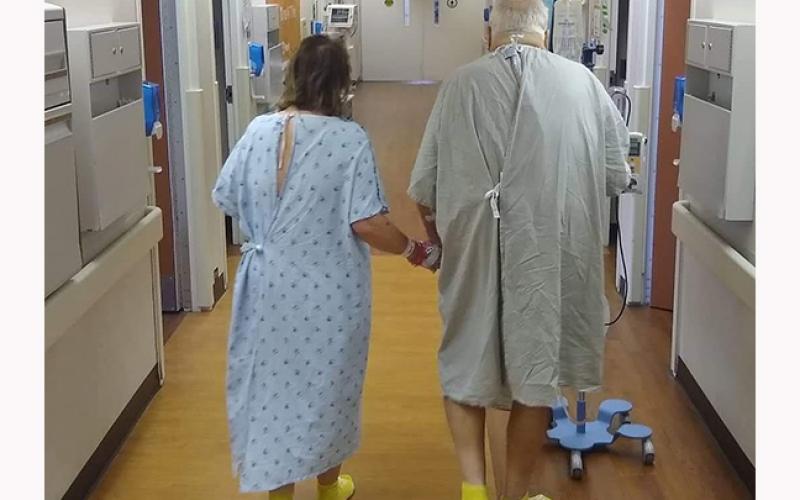Bellview – While giving one your heart is often seen as the ultimate expression of love, donating a kidney can also suffice.
When local resident Jacky Egli’s husband, Rich Egli, was faced with end-stage kidney disease in 2018, she was able to extend his life by acting as a live kidney donor for him. Because of her donation, Rich was able to live long enough to see his son get married, among his other
accomplishments.
Sadly, Rich died in 2020 after falling ill with a rare form of meningitis.
“He got approved for a transplant in November 2018, and at that point he was Stage IV starting to teeter on Stage V (kidney disease),” Jacky Egli said. “When you’re Stage V, what they look for is the percentage of function in your kidneys. So if you’re at 20 or 25 (percent), it’s starting to get critical, and you start talking about things like dialysis or transplant.”
She said Rich chose the transplant route since it would offer more freedom following the operation, compared to the repetitive nature of dialysis.
“We were at his appointment, and he got approved. They did his day workup and came up to us in the afternoon, and said, ‘Yes, you’re going to be approved to be on the transplant list,’ ” Egli said. “They recommended that we cast a wide net, talk to family, talk to friends, have people tested to see who could be a match.
“I just raised my hand and said, ‘I want to be the match.’ ”
She said Rich did not want the couple’s two adult children to go through the workup, although both were willing to donate a kidney if need be.
“He just felt like they needed both their kidneys for their life,” Egli said.
She recalled the battery of tests she underwent to determine if she was a match for her husband, including bloodwork, cardio tests and others. She learned that she was a match while at the bank on Jan. 2, 2019.
“I just broke down into tears, because I was so grateful,” she said. “That’s your first big step, to know that you’re a match.”
Rich was listed as needing a kidney, following a heart catheter to clear small blockages in his heart and a six-month wait. He was required to be listed as a recipient before Egli could be cleared fully to donate. She received clearance following her own workup.
“(It was a) huge relief, because at that point Rich was slipping into about a 17 percent function, so it was getting critical,” Egli said. “He was feeling fatigued. He was on a very strict diet at that point. When you start having poor kidney function, you’re on a restricted diet.
“He was very fatigued, but he was still able to be a part of family events, and so on. He didn’t have the energy, but he hung in there.”
The transplant took place at Piedmont Healthcare in Atlanta on Aug. 19. The couple had originally gone to Emory Hospital, but were referred to Piedmont due to it being a better fit for a patient of Rich’s age.
“One of the hardest parts was both of us going back and leaving our adult children in the waiting room,” Egli said. “We were prepped and saying goodbye to both of them because both their parents were undergoing major surgery.”
She said one misunderstanding about kidney transplants was that the old organ is removed as the new one is attached in the body.
“If it has disease or something, they may do it at a later surgery, but they transplant the new kidney in the front abdomen,” Egli said. “My left kidney was taken out, flipped and new plumbing was created for him in the lower right side.”
The couple was required to stay in Atlanta for six weeks following the operation in case of complications. Rich left the hospital three days after the operation but returned due to a hernia, which is a common complication. He was discharged seven days later.
“He felt better,” Egli said. “His bloodworm was showing that the new kidney was working and working well.”
She said that her own healing from the procedure took about two months.
“One thing I’ve learned, and that everybody should know, is that you need to drink about a half-gallon of water every day to keep your kidneys healthy,” Egli said.
With emotion in her voice, she discussed the positive effects the transplant had on Rich’s life and the additional time it gave him. Although, he couldn’t physically attend his son’s wedding in Mexico, he was able to participate virtually.
“The best man took the camera around, so he could participate in a safe way,” Egli said. “He got to see my daughter and guide my daughter in purchasing her first new home. Those are major milestones he got to see and got to be a support to. We got to celebrate our 38th anniversary before he got sick.”
Despite the final outcome, Egli said she would have done it again. She also emphasized the importance of live kidney and liver donors, which allow for a much faster path to donation than cadaver donors. The waitlist for a cadaver donor kidney can be up to eight years.
“As I reflect back to when I was 21, and I checked that I would be an organ donor, people don’t think ‘you don’t have to wait to be an organ donor,’ ” Egli said. “You can give a kidney or part of your liver as a living person to someone who needs it and extend their life, whether it’s a family member or close friend, or what they call altruistic, just donating because you want to.”
A kidney from a live donor can give a recipient up to two more decades.
“Kind of summarizing,” Egli said, “I would do this all again.”

